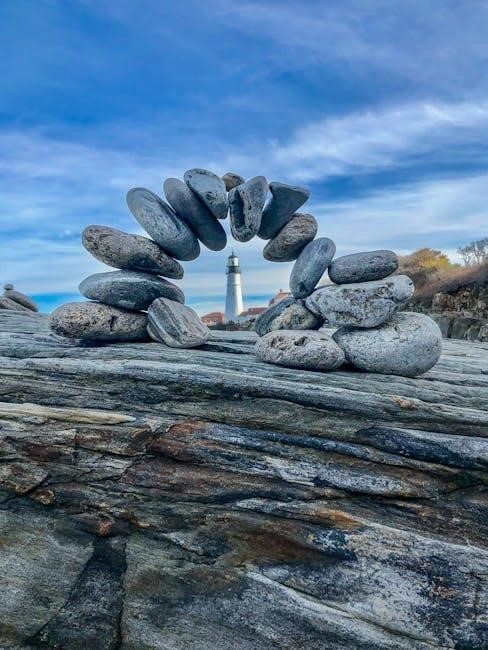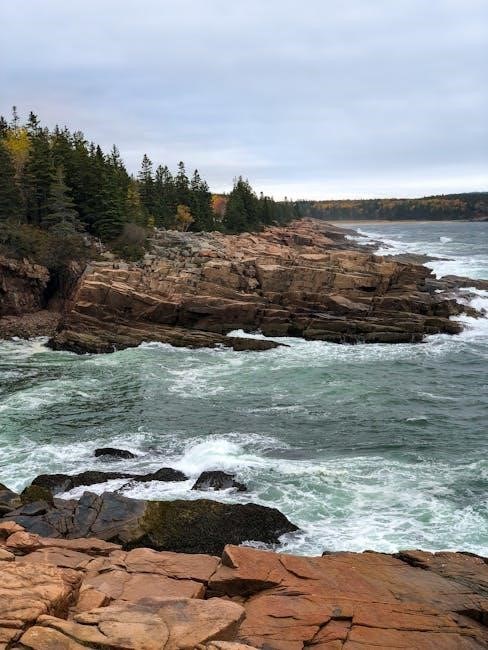Becoming a Registered Maine Guide requires dedication, knowledge, and skill. The process involves passing rigorous written and oral exams, completing a background check, and demonstrating expertise in areas like navigation, safety, and outdoor skills. It’s a prestigious license that recognizes your ability to safely and effectively guide others in Maine’s wilderness.
Understanding the Maine Guide License
The Maine Guide License is a prestigious certification that allows individuals to legally guide outdoor activities such as hiking, fishing, and hunting in Maine. It is offered by the Maine Department of Inland Fisheries and Wildlife and is recognized for its rigorous requirements. The license is categorized into different classifications, including Fishing, Hunting, and Recreation, each requiring specific expertise. To obtain the license, one must demonstrate a deep understanding of Maine’s wilderness, safety protocols, and environmental regulations. The process involves passing both written and oral exams, which test knowledge of local regulations, navigation, and emergency response. The exams are challenging, with a passing score of 70% or higher. Additionally, applicants must undergo a background check and meet eligibility criteria, which may include age requirements and first aid training. This comprehensive certification underscores the guide’s ability to safely and effectively lead others in Maine’s diverse outdoor environments.
Meeting the Eligibility Criteria
To become a Registered Maine Guide, applicants must meet specific eligibility criteria. The primary requirement is being at least 18 years old. A background check is mandatory, and applicants must submit fingerprints through an approved service like IdentGO. Additionally, candidates must demonstrate a strong understanding of Maine’s outdoor environment and safety protocols. While formal education is not required, extensive experience in the relevant field (e.g., fishing, hunting, or recreation) is highly recommended; Applicants must also show proficiency in navigation, first aid, and emergency response techniques. Some classifications, such as whitewater guiding, require current CPR and first aid certification. The Maine Department of Inland Fisheries and Wildlife ensures that all candidates meet these standards to guarantee the safety and expertise of guides. These criteria are designed to ensure that only qualified individuals can lead others in Maine’s wilderness, upholding the state’s high standards for outdoor guiding.
Passing the Required Exams

Passing the required exams is a critical step in becoming a Registered Maine Guide. The process involves both written and oral examinations, which are notoriously challenging. Candidates must achieve a minimum score of 70% on each exam to qualify. The written exam assesses knowledge of Maine’s outdoor environment, including ecology, wildlife, and regulations. It also tests navigation skills, such as map and compass work, and familiarity with state laws related to hunting, fishing, and boating.
The oral exam evaluates practical guiding skills and the ability to handle real-life scenarios. Candidates must demonstrate their expertise in areas like emergency response, weather interpretation, and client management. The exams are specific to the classification of guiding being sought, such as fishing, hunting, or recreation. Preparation is key, and many applicants enroll in training programs or use study materials to ensure they are well-prepared. The rigorous nature of these exams ensures that only highly qualified individuals earn the prestigious Maine Guide license.

Preparing for the Maine Guide Exams
Preparing for the Maine Guide exams involves enrolling in registered training programs, utilizing study materials, and practicing with mock exams. Understanding the exam content, including ecology, navigation, and regulations, is crucial for effective success.
Enrolling in a Registered Maine Guide Training Program
Enrolling in a Registered Maine Guide Training Program is a critical step in preparing for the exams. These programs are specifically designed to cover the necessary skills and knowledge required to become a licensed guide. They often include hands-on training in map and compass navigation, wilderness first aid, and local regulations. Many programs also offer mock oral boards and written exams to simulate real test conditions. Instructors with extensive experience provide valuable insights and tips to help candidates build confidence and competence. Some programs even tailor their curriculum to address individual weaknesses or knowledge gaps. By participating in these structured courses, aspiring guides gain a comprehensive understanding of Maine’s outdoor environment, safety protocols, and legal requirements. This structured learning environment ensures that candidates are well-prepared for both the written and practical aspects of the Maine Guide exams.
Utilizing Study Materials and Resources
Utilizing study materials and resources is essential for successfully preparing for the Maine Guide exams. Candidates should gather a variety of resources, including books, online guides, and practice exams, to build a strong foundation of knowledge. Many applicants find it helpful to review publications such as the Maine Department of Inland Fisheries and Wildlife regulations and local outdoor guides. These materials provide detailed information on topics like wildlife, navigation, and safety protocols. Additionally, online forums and communities of current and aspiring guides often share valuable tips and insights. Practice exams and study guides specific to the Maine Guide tests can help identify areas needing improvement. It’s also beneficial to study maps of Maine’s wilderness areas and familiarize oneself with local ecosystems. By leveraging these resources, candidates can ensure they are well-prepared for both the written and oral exams, covering essential topics such as survival skills, environmental knowledge, and legal requirements.
Practicing with Mock Exams and Oral Boards
Practicing with mock exams and oral boards is a critical step in preparing for the Maine Guide exams. These tools simulate real-test conditions, helping candidates assess their knowledge and identify areas for improvement. Mock exams often cover topics such as wildlife identification, navigation, and safety protocols, mirroring the actual written test. Oral boards, on the other hand, focus on practical scenarios, requiring candidates to demonstrate their problem-solving and communication skills. Many training programs offer mock exams and oral board simulations, providing hands-on experience. Candidates should also practice articulating their answers clearly and confidently, as the oral exam evaluates both knowledge and presentation. Regularly reviewing mistakes and refining responses is essential for success. By consistently practicing with these tools, aspiring guides can build confidence and ensure they are well-prepared for the rigorous evaluation process.

Maintaining and Renewing Your Guide License
Maintaining your Maine Guide license requires completing continuing education courses and staying updated on outdoor regulations. Renewal involves submitting proof of ongoing training and adhering to state requirements to ensure guides remain knowledgeable and compliant with safety standards.

Completing Continuing Education Requirements
To maintain your Maine Guide license, you must complete continuing education courses approved by the Maine Department of Inland Fisheries and Wildlife. These courses ensure guides stay updated on safety protocols, outdoor regulations, and best practices. Topics may include wilderness first aid, map and compass navigation, and environmental conservation. Many guides enroll in registered training programs or workshops that offer specialized knowledge in areas like hunting, fishing, or canoeing. Additionally, some courses focus on customer service and risk management to enhance guiding skills. Completion of these courses is mandatory for license renewal, typically every few years, and proof of attendance must be submitted. Staying informed through continuing education not only keeps your license active but also ensures you provide safe and knowledgeable guidance in Maine’s vast outdoor environments.
Staying Updated on Maine’s Outdoor Regulations
Staying informed about Maine’s outdoor regulations is crucial for maintaining your guide license and ensuring compliance with state laws. Maine frequently updates its regulations to protect natural resources, wildlife, and public safety. Guides must stay abreast of changes in fishing, hunting, and boating laws, as well as environmental conservation practices. Regularly reviewing the Maine Department of Inland Fisheries and Wildlife website is a reliable way to stay updated. Additionally, attending workshops or seminars hosted by the department can provide insights into new rules and policies. Understanding land use restrictions, permits, and seasonal guidelines is also essential. Failure to comply with regulations can result in penalties or even license suspension. By staying proactive and informed, you can ensure your guiding activities remain legal and environmentally responsible while providing a safe and enjoyable experience for clients. Continuous awareness of Maine’s outdoor regulations is a key component of being a responsible and professional guide.
